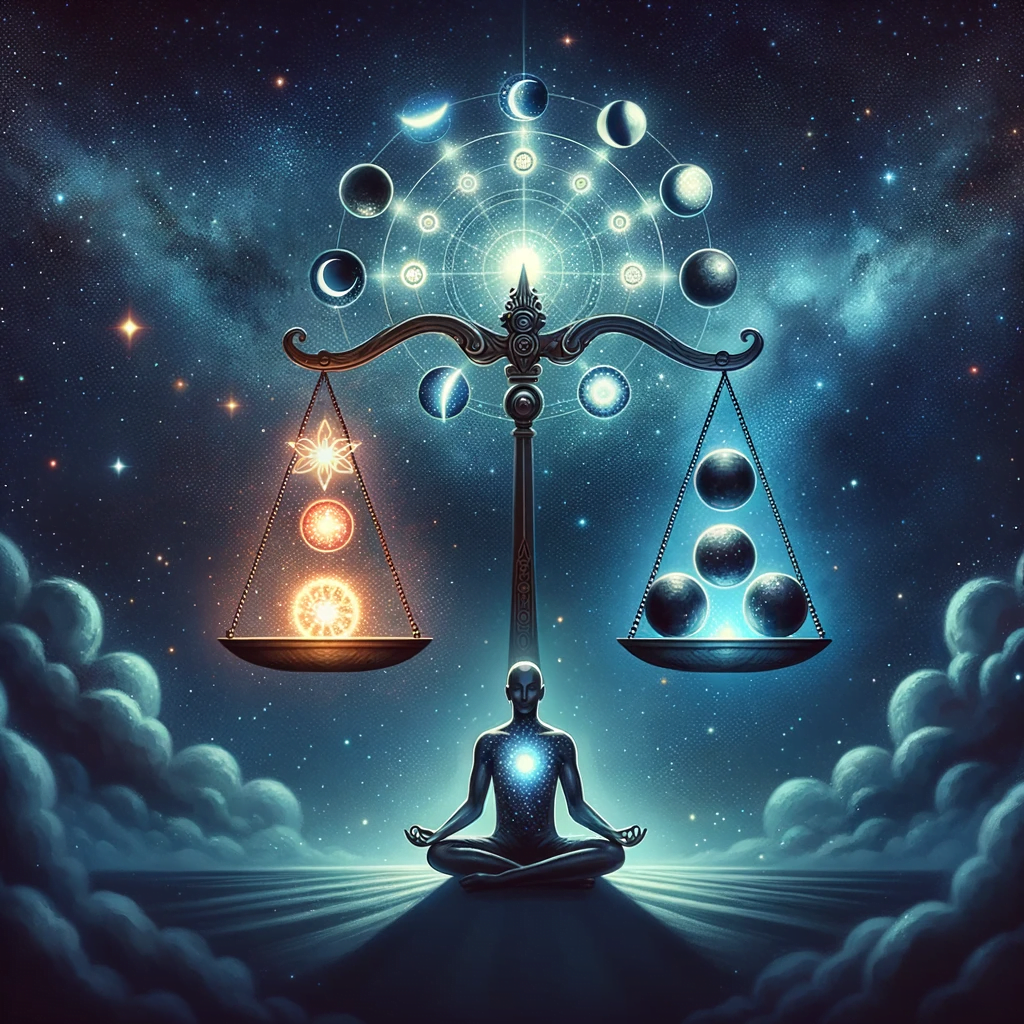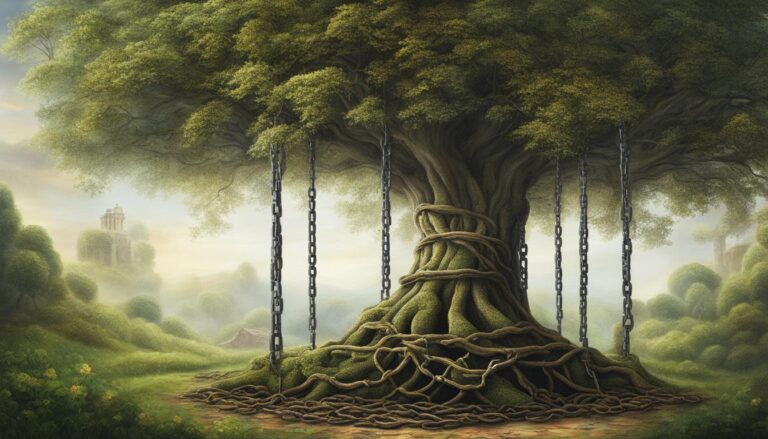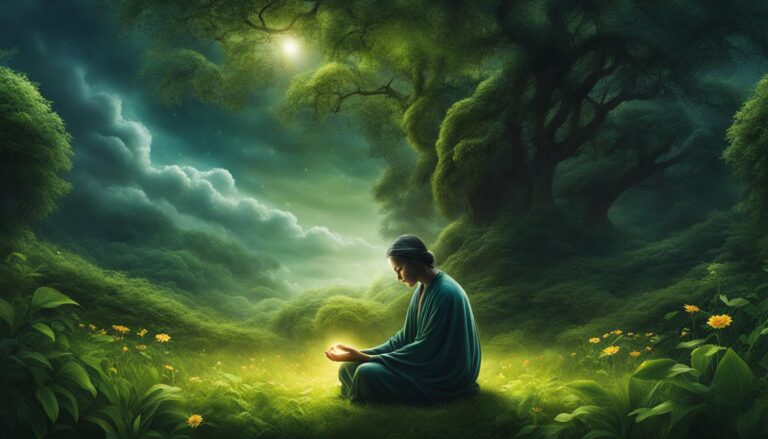Understanding Karma: Unmasking the Joyful Secrets and Harsh Realities of Cosmic Balance
Throughout my spiritual journey, I have embarked on a quest to unravel the intricacies of karma – an age-old philosophy that holds immense significance in Hinduism and Buddhism. Karma is not just a mere concept; it is a profound understanding of the law that governs cause and effect, shaping our destinies and influencing the course of our lives. By delving deep into the teachings and exploring the core principles of karma, I have gained valuable insights into the mechanics of this universal phenomenon.

Key Takeaways:
- Understanding Karma is essential to comprehending the purpose and balance of our existence.
- Karma is a universal law that governs cause and effect in all aspects of life.
- Karma plays a crucial role in Hinduism and Buddhism, shaping beliefs and guiding spiritual practices.
- Reincarnation is intricately linked to karma, as our actions in previous lives determine our current circumstances.
- By embracing the power of choice and cultivating positive actions, we can create a more harmonious and fulfilling life.
The Concept of Karma in Spiritual Traditions
Karma is a central teaching in many spiritual traditions, including Hinduism, Buddhism, Sikhism, Taoism, and Jainism. It is the belief that our actions have consequences and that present actions affect future lifetimes. Karma is intricately linked to causality and the principle of cause and effect. It is a universal law, similar to gravity, that governs all of life.
The law of karma states that as you sow, so shall you reap, but a hundred times over. Our world is the result of our previous actions, words, and thoughts. Karma can be experienced in the current lifetime or carried over to future lifetimes. It is through spiritual practice and enlightenment that one can be liberated from the cycle of karma and attain freedom.
The Concept of Karma in Spiritual Traditions
Karma is a central teaching in many spiritual traditions, including Hinduism, Buddhism, Sikhism, Taoism, and Jainism. It is the belief that our actions have consequences and that present actions affect future lifetimes. Karma is intricately linked to causality and the principle of cause and effect. It is a universal law, similar to gravity, that governs all of life. The law of karma states that as you sow, so shall you reap, but a hundred times over.
Our world is the result of our previous actions, words, and thoughts. Karma can be experienced in the current lifetime or carried over to future lifetimes. It is through spiritual practice and enlightenment that one can be liberated from the cycle of karma and attain freedom.
“Karma is a universal law, similar to gravity, that governs all of life.”
In Hinduism, karma is deeply ingrained in the belief system. It is believed that every action, whether good or bad, leads to certain consequences or rewards. Karma is seen as a way to balance the scales of justice in the universe, ensuring that every individual receives what they deserve based on their actions. Similarly, Buddhism also teaches the concept of karma and its role in shaping our lives. It emphasizes the importance of cultivating positive intentions, thoughts, and actions to create good karma and break free from the cycle of suffering.
| Spiritual Tradition | Belief in Karma |
|---|---|
| Hinduism | Deeply ingrained belief in karma and its consequences |
| Buddhism | Emphasis on cultivating positive karma to break free from suffering |
| Sikhism | Belief in karma as part of the cycle of birth and death |
| Taoism | Karma as a way to attain harmony with the Tao |
| Jainism | Strict observance of non-violence to avoid negative karma |
Understanding karma in these spiritual traditions goes beyond a simple cause-and-effect relationship. It is about recognizing the interconnectedness of all beings and the responsibility we have for our own actions. By understanding karma, we can strive to create positive intentions and actions, leading to a more harmonious and fulfilling life.
Understanding the Mechanics of Karma
Karma operates through a fascinating process of rebirths and interconnectedness. Our actions in one lifetime create impressions and tendencies in our minds, which in turn lead to more actions and more karma. These karmic seeds are carried in our subtle body, and we experience the effects of karma in our physical bodies. It is a continuous cycle of cause and effect, where our past actions shape our present and future experiences.
There are different types of karma that determine the lessons and experiences we encounter in our lives. Prarabdha karma refers to the karmic seeds that have ripened and are currently manifesting in this lifetime. Sancita karma encompasses all the accumulated karma from past lives that is yet to be experienced. Agami karma, on the other hand, is the karma that we are currently creating through our actions, thoughts, and intentions.
Karma operates on various levels, including personal, family and ancestral, societal, and national karma. These different levels of karma intertwine and influence each other, creating a web of interconnectedness that shapes our individual and collective experiences. By understanding the mechanics of karma and its different aspects, we can gain insight into the patterns and lessons that unfold in our lives.
Karma and Reincarnation
Karma is intrinsically linked to the concept of reincarnation. The cycle of birth and death allows for the continuation of karmic cycles and the opportunity for spiritual growth. In each lifetime, we carry forward the karmic imprints from past lives, which determine the circumstances and challenges we face. Reincarnation gives us the chance to learn from our past actions and make different choices in subsequent lives.
Through the process of reincarnation, we have the opportunity to evolve and transcend the limitations of our past actions. It is a journey towards self-realization and enlightenment, where we strive to break free from karmic entanglements and experience liberation. Understanding the connection between karma and reincarnation can inspire us to make conscious choices and cultivate positive actions in order to create a more harmonious and fulfilling existence for ourselves and others.
| Karma | Meaning |
|---|---|
| Karma | The law of cause and effect that governs our actions and experiences. |
| Prarabdha karma | The karmic seeds that have ripened and are manifesting in the current lifetime. |
| Sancita karma | The accumulated karma from past lives that is yet to be experienced. |
| Agami karma | The karma that we are currently creating through our actions, thoughts, and intentions. |
“Karma is the ultimate teacher, guiding us towards self-realization and liberation from the cycle of rebirth.”
Karma and Misfortune
Karma is often used to explain misfortune in the world. It is believed that the experiences we face are the result of our past actions. While this may seem like a punishment for wrongdoings, karma is better understood as a way to learn and grow. Difficult situations and encounters with challenging individuals are opportunities for us to evolve and gain wisdom.
Karma teaches us that we have the power to choose how we respond to any given situation. By cultivating understanding and compassion, we can break free from negative karmic patterns. Rather than seeing misfortune as a predetermined destiny, karma reminds us that our actions and intentions shape our reality. It is through conscious choices and positive energy that we can sow the seeds for a more harmonious and fulfilling life.
“Our actions are the architects of our own destiny.” – Swami Sivananda
Karma and the Power of Resilience
When faced with misfortune, it can be tempting to succumb to victimhood and despair. However, understanding karma empowers us to rise above challenging circumstances and embrace resilience. Karma teaches us that our current experiences are not the end-all-be-all, but rather opportunities for growth and transformation.
By reframing our mindset and viewing misfortune as a catalyst for personal evolution, we can tap into our inner strength and navigate life’s challenges with grace and determination. Through the lens of karma, we can find solace in the knowledge that every adversity holds within it the seeds of possibility and growth.
| Karma and Misfortune | Key Insights |
|---|---|
| 1. Misfortune as a learning opportunity | Difficult situations and encounters with challenging individuals provide opportunities for growth and wisdom. |
| 2. The power of choice | Karma reminds us that we have the power to choose how we respond to misfortune and challenges. |
| 3. Cultivating understanding and compassion | By cultivating understanding and compassion, we can break free from negative karmic patterns. |
| 4. Embracing resilience | Understanding karma empowers us to embrace resilience and view misfortune as an opportunity for growth. |
The Real Meaning of Karma
Understanding karma goes beyond wishing harm upon others or seeking revenge. Karma is a reflection of ourselves and our past actions. It is a way to take responsibility for our experiences and choices. By realizing that we have created everything that is happening to us, we can shift from being victims to being empowered. Karma is not about blaming ourselves or others but about cultivating awareness and choosing a positive response.
We can use the laws of karma to create success in our lives by focusing on helping others and sending positive energy to the universe. The power of karma lies in understanding that every action, whether big or small, has consequences. By consciously choosing to act with kindness, compassion, and integrity, we can sow the seeds for positive outcomes in our own lives and the lives of those around us. In this way, karma becomes a force that guides us towards personal and collective growth.
“The purpose of our lives is to be happy.” – Dalai Lama
Karma and destiny are intertwined. Our actions and intentions shape our future and the experiences we attract. By recognizing that everything we send out to the universe comes back to us, we can make conscious choices that align with our highest purpose and values. Karma teaches us that we have the power to create our own reality by cultivating positive thoughts, words, and actions.
Karma and Personal Transformation
Karma provides us with opportunities for personal transformation. It challenges us to break free from negative karmic patterns and cultivate qualities such as forgiveness, gratitude, and compassion. When faced with difficult situations or challenging individuals, we can choose to respond with understanding and love rather than with anger or resentment. By doing so, we can release the negative energies that bind us and create space for growth and healing.
In conclusion, understanding karma is about recognizing the interconnectedness of our actions, choices, and experiences. It is about taking responsibility for our own happiness and well-being. By embracing the real meaning of karma, we can empower ourselves to create a more harmonious and fulfilling life.

Releasing Limiting Beliefs and Embracing Dharma
To release ourselves from the shackles of limiting beliefs and embrace our true potential, we must confront and transcend the karmic patterns that hold us back. Dharma, the universal cosmic order that governs all beings, provides us with the guidance and wisdom to navigate the complexities of our existence. By aligning ourselves with our dharma, we can break free from the cycles of karma and live a life of purpose and fulfillment.
One powerful practice to release limiting beliefs is to identify and acknowledge the stories that no longer serve us. By writing them down, we bring them to the surface and gain a clearer understanding of how they have shaped our lives. To symbolically let go of these beliefs, we can perform a ceremony where we burn or bury the written stories, signaling our intention to release their hold over us.
Another technique is to freeze negative energies that perpetuate our limiting beliefs. Placing photographs or written representations of these energies in the freezer serves as a metaphor for chilling out their influence on our thoughts and actions. As we cool down the negative energies, we create space for new perspectives and beliefs to emerge.
| Techniques to Release Limiting Beliefs | Description |
|---|---|
| Writing Down Limiting Beliefs | Identify and acknowledge limiting beliefs by writing them down. |
| Ceremony of Letting Go | Perform a ceremony to symbolically release the written beliefs. |
| Freezing Negative Energies | Place photographs or representations in the freezer to cool down their influence. |
Additionally, recording and listening to our limiting belief stories can create a sense of fatigue that motivates us to change and embrace new narratives. By repeatedly exposing ourselves to our own negative thought patterns, we become more aware of their impact and are driven to break free from their hold.
Embracing dharma is essential to navigating the complexities of our karmic journey. It involves learning from teachers and difficult individuals who cross our paths, as they often serve as mirrors that reflect the areas where we need to grow. By embracing the lessons presented to us, we can transcend our karmic patterns and unlock our higher potential.
The Journey of Releasing Limiting Beliefs and Embracing Dharma
In embarking on the journey of releasing limiting beliefs and embracing dharma, we must cultivate self-awareness and the willingness to change. By challenging our preconceived notions and embracing new narratives, we can break free from the cycles of karma that bind us.
“The only way out is through. To release limiting beliefs, we must confront them head-on and actively seek transformation.” – Anonymous
As we release the grip of limiting beliefs and align ourselves with our dharma, we open ourselves up to new possibilities and experiences. We become active participants in shaping our destiny, rather than passive recipients of our past actions. The journey of releasing limiting beliefs and embracing dharma is one of self-discovery, growth, and liberation.
The Power of Choice and Creating Positive Karma
The concept of karma is centered around the idea that our actions have consequences and that we shape our own destiny through the choices we make. It teaches us that we have the power to create positive outcomes by consciously choosing to send positive energy into the universe. By understanding the laws of karma, we can cultivate awareness and make choices that sow the seeds for positive opportunities in our lives.
When we engage in acts of kindness and compassion, we elevate our vibrations and create positive karma. Helping others not only benefits them but also brings us a sense of fulfillment and joy. It allows us to break free from negative thought patterns and cultivate a mindset of abundance and positivity. By choosing to focus on our own growth and well-being, we can create a ripple effect of positivity in the world.
It is important to remember that karma is not about blaming ourselves or others. Rather, it is a tool for self-reflection and personal growth. By taking responsibility for our experiences and choices, we can empower ourselves to make conscious decisions that align with our values and beliefs. Through the power of choice, we can create a life filled with harmony, love, and happiness.
The Journey Towards Enlightenment

Understanding karma is a transformative journey that leads us towards enlightenment and liberation from the cycle of rebirth. It is a profound exploration of our actions, consequences, and the interconnectedness of all beings. By delving deep into the teachings of karma, we can elevate our consciousness and break free from karmic entanglements, paving the way for a harmonious and fulfilling life.
Throughout this journey, self-reflection plays a crucial role. It is by looking within that we gain insight into our past actions and their effects on our present reality. Through introspection, we can identify patterns, release limiting beliefs, and heal wounds that may be holding us back. Self-reflection allows us to take responsibility for our experiences and empowers us to make conscious choices moving forward.
In addition to self-reflection, cultivating compassion and kindness is essential on the path to enlightenment. By embracing empathy and understanding, we can break free from the cycle of negative karma. Compassion towards others is an opportunity to evolve and grow, both individually and collectively. It allows us to transcend ego-centered desires and shift our focus towards the well-being of all beings.
Conclusion
Karma is a profound and complex concept that holds deep significance in various spiritual traditions. It provides us with a framework to understand the interconnectedness of our actions and their consequences, not only in this lifetime, but also in future ones. By comprehending the philosophy of karma, we gain insight into the law of cause and effect and how it shapes our experiences.
Both Hinduism and Buddhism emphasize the teachings of karma, emphasizing that our actions, thoughts, and intentions have a ripple effect on our present and future realities. Understanding karma allows us to take responsibility for our experiences and make conscious choices to create positive outcomes.
As we delve into the concept of karma, we realize that it is not solely about punishment or blame. Rather, it presents an opportunity for growth and transformation. By releasing limiting beliefs, embracing our dharma, and cultivating compassion and kindness, we can break free from negative karmic patterns and strive towards enlightenment.
Ultimately, karma teaches us that we have the power of choice. Our actions and intentions shape our destiny, influencing the experiences we attract. By consciously choosing to send out positive energy, practicing compassion, and focusing on personal growth, we can create a more harmonious and fulfilling life.
You might want to read this: Manifest Your Dream Life
FAQ
What is karma?
Karma is the belief that our actions have consequences and that present actions affect future lifetimes. It is a universal law, similar to gravity, that governs all of life.
Which spiritual traditions teach about karma?
Karma is a central teaching in many spiritual traditions, including Hinduism, Buddhism, Sikkhism, Taoism, and Jainism.
How does karma work?
Karma works through a process of rebirths. Our actions create impressions and tendencies in our minds, which then lead to more actions and more karma. Different types of karma determine the experiences and lessons we encounter in our lives.
Is karma punishment for wrongdoings?
Karma is better understood as a way to learn and grow. Difficult situations and encounters with challenging individuals are opportunities for us to evolve and gain wisdom.
How can I break free from negative karmic patterns?
To move beyond limiting beliefs and patterns, you can engage in practices that help release negative thought patterns. Writing down the stories that hold you back and performing a ceremony to let go of them can be a powerful tool.
What is dharma?
Dharma is about learning and growing from the teachers and difficult individuals in our lives. It is through striving to understand ourselves and our purpose that we can break free from karmic cycles.
How can I create positive karma?
By recognizing that everything we send out to the universe comes back to us, we can consciously choose to send positive energy and create positive karma. Helping others and practicing compassion are ways to elevate our vibrations and sow the seeds for positive opportunities in our lives.
What is the ultimate goal of understanding karma?
The ultimate goal is to attain enlightenment and liberation from the cycle of rebirth. Through spiritual practices and deepening our understanding of karma, we can elevate our consciousness and break free from karmic entanglements.







